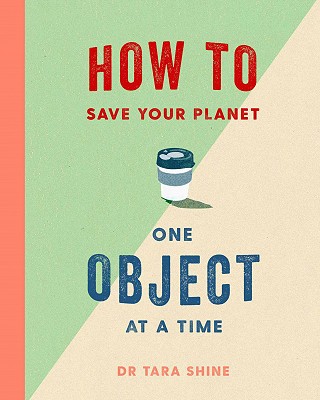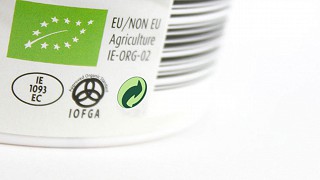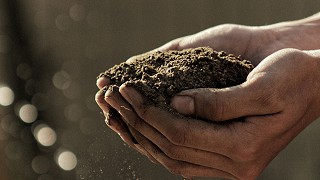
‘Systemic change is a deeply personal endeavour’
How to Save your Planet One Object at a Time by Dr Tara Shine
Dr. Tara Shine’s new book was published in April 2020 by Simon & Schuster.
‘an unpreachy guide…free of jargon and full of surprising information’ The Times
How to save your Planet Podcast
Dr Tara Shine takes you from room to room, object to object, suggesting how each one of us can play our part in reducing the impact we have on our planet – and improve our own lives in the process. Tara will run through some of the conundrums and confusion we all face in living more sustainably and point out the practical steps we can take to minimise our impact on the planet.
Trust us to show you how it’s done
Here are some simple tips on how to reduce waste and live more sustainably.
-
Think before you drink!
When you end up buying drinks on the go you are creating and contributing to waste. That plastic bottle will either need to be recycled, incinerated or go to landfill. Bring your own bottle with you where ever you go and fill up on good, high quality Irish tap water whenever you can.
-

The Green Dot
The green dot – which is not always green - does not mean the packaging is recyclable. It just means the producer of the packaging has contributed to the recovery and recycling of the packaging.
-
Soft Plastics
Soft plastics are not currently recyclable in Ireland. They are anything that scrunches up and then loosens out again such as a plastic bag, cling film, that bag the apples come in, film on the top of fruit punnets etc. The guidelines for Irish consumers’ state that they must be thrown in the household rubbish bin. Unfortunately you need to just put them in the rubbish bin.
-
Bamboo Toothbrushes
Plastic toothbrushes are not recyclable. They languish in landfills or end in the seas as marine litter causing untold damage to marine life. Try using a toothbrush made from sustainably harvestedbamboo instead as your bamboo toothbrush can be composted. Pop it in your brown bin to go to an industrial composter or use a home composter but be aware it might take some time to break down. Think about reuse – write on it to label the seeds in your garden.
-
Pegs
Broken plastic pegs cannot be recycled as they contain metal. They break into small pieces and get lost in the grass working their way into the soil or the mouth of poor unassuming wildlife. Bring your pegs in off the line when not in use to prolong their life and try wooden ones from a sustainable source instead.
-
Bees wrap
Cling film is not recyclable. Bees wrap is a natural alternative. And it works! It needs the heat of your hands to mould the section around whatever it is you want to protect. It can be rewashed numerous times and reused. Alternatively, just plop a plate over that bowl of leftovers.
-
Soaps
Is your bathroom full of plastic bottles? Don’t forget to recycle those plastic containers when they are empty. Look out for smarter, convenient AND sustainable alternatives. Like soap! There are beautiful soap companies out there now, creating everything from shampoo bars to body scrubs, shaving bars, to conditioners. More often than not, they also come in sustainable packaging too, and are made locally. All the wins!
-
Clean, Dry, Loose
Clean means clean means clean. Items that get put into the recycling bin with food residue, or are damp, will contaminate the whole bin. This can be avoided by rinsing in the sink and letting the item drip dry until they are ready to place in the bin. Ideally, items should be put in loosely and not stacked one inside the other i.e. don’t pack the empty cereal box with multiple yoghurt cartons.
-
Food Waste
Is your waste bin heaving? How much of that is food waste? If you live in an area with 500 people or more you are entitled to a brown bin from your waste provider and you have a legal obligation to dispose of food waste correctly (by putting it in your brown bin, by composting it, or by bringing it to a central composting location). When you bin excess food you basically bin money. And when food ends up in landfill, it creates dangerous green house gases.
-
Think Before You Flush
People flush all kinds of things down the loo, including dental floss, tampons, tampon applicators, contact lenses, nappies, wipes, plasters, ear buds, and cotton pads. None of these should be flushed down the toilet. Why? They block the system, they do not degrade and they pollute the water systems. So use a bin not the loo and make smart choices.
-
Bathroom Etiquette
The bathroom is the second biggest producer of perfectly recyclable material, after the kitchen. Can you fit a second bin in there? If so, give those shampoo bottles a rinse when finished and keep them separate from the other general waste. Equally, know what can in fact be recycled and what cannot not. Currently, we are being told to ignore all symbols and numbers on rigid plastic items and to place all rigid materials (regardless of colour, symbol or number) in the household-recycling bin.
-
Tube Know-How
Tubes are impossible to empty completely. As a result, an empty tube of toothpaste is not recyclable. An empty tube of tomato puree is not recyclable. An empty tube of face cream is not recyclable. We just can’t get them completely empty and thus they are not completely clean.
-

Compostable Does Not Equal Recyclable
Compostable cups/plates/bowls can only go in an industrial composter after use. If you’ve a brown bin at home, that’s where all your compostable waste gets taken away to. Home composters can’t compost compostable cups/plates/bowls. That take away compostable coffee cup? Needs to be put in a bin you know is going to go for industrial composting. It is NOT recyclable. The lid should be compostable too, but check to be sure as it might just be plastic.
Conversely some plastic glasses and plates are recyclable if clean. You need to check to be 100% sure though.
-
Yoghurt Pots
Yoghurt comes in many shapes and sizes! Buy the biggest pot you can and that reduces the packaging. Individual plastic pots can be recycled when clean and dry but the lid is soft plastic and has to go in the rubbish bin. Bigger pots sometimes have a cardboard sleeve you can remove to recycle. Then clean the rigid plastic pot and the lid and recycle those too. The soft plastic lid has to go in the rubbish. Some brands use glass jars which can be brought to a bottle bank for recycling – or reused as glasses or containers in your home. Yoghurt tubes are soft plastic and have to go in the rubbish bin.
-
Pet Food
Lots of us love our pets and lavish the best food we can afford on them. The packaging you choose matters. Tins of cat food can be easily recycled, but only if they are empty, clean and dry. The soft plastic pouches can’t be recycled. So they go in the rubbish bin. The rigid plastic tubs can be recycled if clean and dry, but the foil lid goes in the rubbish bin. And the foil tubs also need to go the rubbish bin as they are not currently recyclable in Ireland.
-
Free The Fruit & Veg
Individually wrapped foods are a symbol of how convenience is leading to excess waste. Perhaps they help to avoid waste for people who needed smaller portions, but most of us could live without them. Tea in a bag, with a tag, in a wrapper, in a box, wrapped in plastic… is this really necessary? Try loose tea or tea bags that are happy to coexist in the packet. Several brands are working on removing the plastic that holds tea bags together in response to consumer demand.
-
Individually Wrapped
Individually wrapped foods are a symbol of how convenience is leading to excess waste. Individually wrapped crackers, biscuits, tea bags, chocolate bars, etc. Perhaps they help to avoid waste for people who needed smaller portions, but most of us could live without them. Individually wrapped tea bags take the biscuit! Tea in a bag, with a tag, in a wrapper, in a box, wrapped in plastic. Really! Try loose tea or tea bags that are happy to coexist in the packet. Several brands are working on removing the plastic that holds tea bags together in response to consumer demand.




